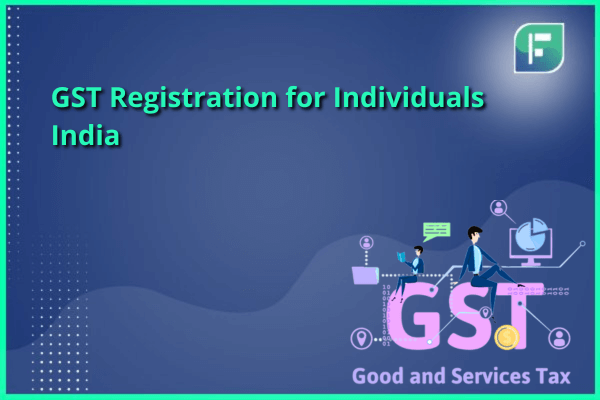There are many types of goods and services tax registration as per the Goods and Services Tax Act of 2017. GST registration for individuals is one of them. A tax imposed on the exchange of products and services is known as the goods and services tax. This tax has its own benefits and advantages due to which it has been suggested to all the businesses which fall under the threshold limit of the GST to opt for the same.
GST is not a one night change in the tax system of India. It came into force after a lot of efforts by the government.There was strong opposition to India’s introduction of the goods and services tax.But later people understood its concept and now it is applicable all over India. The current blog will discuss one of its aspects that is goods and services tax or GST registration for the individuals. Even if you plan to register individuals for GST, there are numerous facets of GST registration that you need to be aware of.
What is GST Registration?
GST Registration for individuals is the process where individuals enlist with the goods and services tax department. It is possible to do this registration after reaching a set sales limit, known as the GST registration limit for goods and services. This registration is a requirement under the Goods and Services Act of 2017. It is essential for being recognized as GST taxpayers. It involves taxation on the exchange of goods and services. It is one of the most significant tax reforms in India, akin to tax systems in about 160 other countries. Through this registration, the country aims to unify taxes, consolidate different indirect taxes, prevent tax evasion, widen the taxpayer base, and encourage digital tax practices, ensuring a more streamlined and effective tax system in India.
Taxation Before GST in India
Before the implementation of GST in India, there existed a multitude of taxes at both the central and state levels. All of which were subsequently replaced by goods and services tax. This was implemented in India through the Goods and Services Tax Act of 2017.
Central taxes included Central Excise Duty, duties on medical and toilet preparations, additional duties on goods of special importance, customs duties like CVD and SAD, along with Service Tax, and various cesses and surcharges associated with the supply of goods and services.
State-level taxes included State VAT, Central Sales Tax, Purchase Tax, Luxury Tax, Entry Tax, Entertainment Tax, Amusement Tax, taxes on advertisements, lotteries, betting, and gambling. Additionally, state-related cesses and surcharges connected to the supply of goods and services were part of the pre-GST tax landscape in India.
Components of GST Registration for Individuals
There are a total four components of the GST registration for individuals in India. All four of them are mentioned below:
- State Goods and Services Tax (SGST)
- Union Territory Goods and Services Tax (UTGST)
- The Central Goods and Services Tax (CGST)
- The Integrated Goods and Services Tax (IGST)
Together, these elements enable more seamless transactions and compliance, creating a national taxation system.
Benefits of the GST Registration in India
GST in India offers several key advantages which are mentioned below:
- Fostering greater reliability among competitors
- Building trust among consumers and investors.
- GST registration for individuals facilitates easier fundraising and investment opportunities for businesses,
- Providing simpler access to loans
- Offering a composition scheme tailored for small enterprises.
- The system ensures straightforward GST registration and online compliance, enhancing a business’s efficiency and regulating the unorganized sector
- Contributing to a more structured and accountable business environment overall.
- Simplified taxation process ensures easier compliance.
- Registration establishes credibility and legitimacy in the eyes of consumers and investors.
- Claiming credit for taxes paid on purchases can reduce the overall tax burden.
- Enables access to a larger market and provides an opportunity to expand business.
- Promotes transparency in transactions
- Enhancing trust and credibility.
Process of GST Registration for Individuals
If you want to take GST registration for the individuals you must be aware about the process of registration for the same. Given below is the step by step procedure to do GST registration for individuals in India. Follow the steps and do your GST registration for individuals:
- The very first step is to visit the official online portal of the goods and services tax department
- On the home screen you will find the option of “services”
- Select the “services” tab
- After that one needs to click on the option of ‘Registration’ and then select ‘New Registration’.
- Fill in Basic Information Enter your PAN details, mobile number, and email address.
- You’ll receive an OTP for verification on the provided mobile number and email.
- Submit the Application After filling in the required information
- Submit the application.
- ARN Generation Upon submission, an Application Reference Number (ARN) will be generated.
- Use this ARN to track the status of your application.
- For the verification and approval the GST officer will review the application.
- If any additional information is required, you’ll receive a notification.
- Once approved, a GST registration certificate will be issued.
Conclusion
GST registration for individuals in India is a significant step for those entering the realm of business transactions. With its inception, GST has replaced multiple taxes and aims to streamline the tax system by unifying various indirect taxes. The registration process, while simplified and accessible through the online portal, ensures individuals are recognized as GST taxpayers under the Goods and Services Act of 2017.
The GST system offers numerous advantages, from creating trust and credibility to fostering transparency and expanding business opportunities. The step-by-step registration process provides a clear roadmap, contributing to a more organized and compliant business environment. Overall, the process not only aims to simplify taxation but also works towards creating a more reliable and structured marketplace, beneficial for both individuals and the economy.






